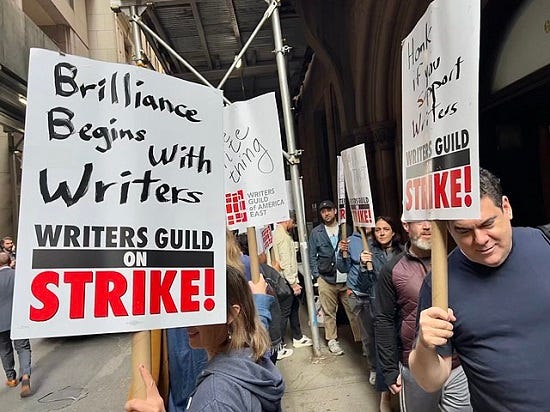Unions and AI: Seeking Permissions, Protections
The Hollywood writers’ strike resulted in some union victories; journalists are watching closely and learning; shareholder meetings also becoming forums
By John P. Desmond, Editor, AI in Business

AI will be on the ballot at upcoming shareholder meetings of the Walt Disney Co. and Apple, thanks to a decision by the Securities and Exchange Commission that the companies will need to include shareholder proposals from the AFL-CIO Equity Index Funds that seek transparency about how the companies are using AI.
According to an account in The Hollywood Reporter, the AFL-CIO proposal requests that Disney “prepare and publicly disclose on the Company’s website a transparency report that explains the Company’s use of Artificial Intelligence (‘AI’) in its business operations and the Board’s role in overseeing AI usage, and sets forth any ethical guidelines that the company has adopted regarding its use of AI.”
A letter from the SEC to Apple requested a report “on the company’s use of Artificial Intelligence (‘AI’) in its business operations and disclose any ethical guidelines that the company has adopted regarding the company’s use of AI technology.”
Both companies sought to exclude the proposals from their annual meetings, arguing that they concern ordinary operations. But the SEC stated to Disney that “in our view, the Proposal transcends ordinary business matters …”
The decision means the proposals will be added to proxy statements to allow Apple and Disney shareholders to vote on whether they want a report on AI. The AFL-CIO counts the WGA East, Actor’s Equity, Communication Workers of America and the American Federation of Musicians among its affiliated unions. Along with its proposal announced in October, the AFL-CIO stated, “The AI dehumanization of the American workforce threatens the very framework of the nation’s economy and endangers the existence of the already dwindling middle class.”
AI is a “hot-button” labor issue in Hollywood, the focal point of the WGA and SAG-AFTRA strikes last year, the Hollywood Reporter account noted.
In the rush to adopt AI in the entertainment industry, “the technology can be used to create literary material and replace human performances,” the AFL-CIO stated in its proposal.
As a result of the strikes, the WGA won worker protections from the use of AI by entertainment companies, but SAG-AFTRA performers have yet to vote to accept concessions around informed consent and fair compensation when AI is used to create or modify a performance.
The AFL-CIO Equity Index Funds, which have more than $12 billion in assets under management, each year submits shareholder proposals that encourage adoption of a range of responsible business practices.
“People are realizing the ways in which artificial intelligence can be used to change the way that they work,” stated Matthew Scherer, senior policy counsel at the Center for Democracy & Technology, in a recent account from Politico. “If you start treating people like automatons using artificial intelligence and electronic surveillance, that drives down their wages in the long run because you’re essentially forcing people into less skilled roles.”
Las Vegas Hotel Workers Also Secure Some Protection from AI
Separately, the union representing hospitality workers in Las Vegas recently secured protections including notification if an employer plans to bring in AI, robotics or other tech into their properties, as well as guarantees around retraining if jobs are shifted due to automation or technology. That union also won the right to bargain over surveillance tools used to monitor employees on the job.
The Culinary Workers Union Local 226 ratified the five-year agreement on November 18, according to an account in Bloomberg Law. It covers 10,000 employees of Caesars Entertainment, reversing pandemic-era job cuts by reinstating employees, and providing advance warning of new technology in the workplace. The proposal passed with 99 percent support of those who voted, the union announced.
Specific boundaries between AI and human creativity are being set in the new Hollywood contracts, especially incorporating consent and permission. For example:
The Writers Guild agreement allows for writers to use AI with company consent, and reserves the “right to assert that exploitation of writers’ material to train AI is prohibited …” according to an account from the Bipartisan Policy Center
In addition, the SAG-AFTRA agreement reached on November 8 incorporates “extensive consent and compensation protections in the use of AI.” It prohibits the use of computer-generated people or digital replicas that imitate human performers without obtaining consent from the real actors, according to the account.
“The entertainment industry negotiated potential remedies for protecting worker rights by emphasizing consent, compensation, and credit for utilizing artists’ work in collaboration with AI,” stated the authors of the report, Angela Luna, a Google Fellow on technology policy, and Danielle Draper, project manager, of the Bipartisan center.
In the copyright area, the US Copyright Office is considering the implications of content created with the help of generative AI. The studios were interested in leveraging GAI to co-write scripts, which human authors would edit or rewrite. Copyright protections can only apply to a certain level of human involvement. “The specific extent of human involvement needed to safeguard AI-assisted creative works is unknown,” the authors stated.
Hearings in the US Congress have opened the door to potential legislation, including amendments to the Copyright Act, the authors stated.
Overall, “The landmark agreements between unions and studios establish the most progressive AI protections in industry history,” the authors stated.
Journalist Unions Also Seeking Protections from AI
In newsrooms, unions are also pushing for protections from AI.
“This is a really hot topic of conversation in union circles because we realize the power it (AI) has,” stated Mike Davis, a reporter and the unit chair of the APP-MCJ Guild, which represents journalists at the Gannett-owned Asbury Park Press, Home News Tribune and Courier News in New Jersey, in a recent account from Poynter. “This stuff’s going to get better and better. I would be hard-pressed to find a Gannett bargaining unit that is not thinking about this.”
Unions representing journalists worldwide began proposing contract language addressing AI last summer. Journalists at The Financial Times Specialist of London ratified a contract which included the right to bargain over the effects of new technology including AI. Union steward David Isenberg stated that at first, the company wanted the right to just “discuss” changes, not bargain over them. However, the union pushed for the word “bargain” because it comes with certain legal obligations.
“Bargaining under the law means they have to actually consider granting concessions and try working in good faith to find an agreement,” Isenberg stated. “A discussion is, ‘Hey, this is what we’re going to do,’ and then the union says, ‘Whoa, we don’t like that.’ And they say, ‘Hey, we discussed it with you,’ and then they implement exactly what they want.”
Journalist unions are chiefly concerned about the potential loss of jobs as AI is introduced. For example, IAPE Local 1096, representing 1,400 Dow Jones employees at the Wall Street Journal, have proposed barring the company from displacing union members via AI. So far, journalist union leaders representing staff at Gannett’s New Jersey newsrooms, Dow Jones and the AP, “all said management has refused to agree to their proposals,” according to the account.
Dow Jones management has said it reserved the right to unilaterally make decisions regarding AI, according to Gannet union rep Davis. Dow Jones has taken a similar stance, according to Dow Jones content operations specialist Jodi Green, who added that the company compares the use of AI to outsourcing. But the union’s current contract requires Dow Jones to notify the union in advance if it wants to outsource jobs.
The journalists are paying close attention to the Hollywood writers’ strike, learning from their experience.
“We’re kind of setting the stage for everybody,” stated Vin Cherwoo, President of the AP News Media Guild. “The language that we get, that we bargain for, is going to be the standard, most likely, that other news unions are going to be presenting to their companies.”
Read the source articles and information in The Hollywood Reporter, a letter from the SEC to Apple, a statement from the AFL-CIO, from Politico, Bloomberg Law, from the Bipartisan Policy Center and from Poynter.
Click on the image to buy me a cup of coffee and support the production of the AI in Business newsletter. Thank you!






